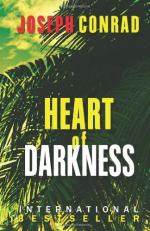|
|
Heart of Darkness Objects/Places
The Company: The vast European trading company which sent Marlow to Africa.
Maps: As a child, Marlow was interested in the blank unexplored spots on maps, which inspired his interest in Africa. He saw such maps, with the blank spots filled, in the Company offices.
White city: This city, most likely Brussels, Belgium, struck Marlow as being sepulchral--like a coffin, cold and dead. He felt uneasy upon first arriving; when he returned he barely saw the people of the city as human. It is always a lonely, disturbing place for him.
French ship: This ship was firing for no apparent reason into a stretch of jungle; its crew claimed that there were 'enemies' they were firing at. The men on the ship, stricken with disease, were dying at a startling rate.
Company Station: The first stop for the ship taking Marlow to Africa. Here the journey to the interior would begin; here dozens of enslaved natives were beginning to build a railroad.
Ivory: The commercial good around which the entire Company revolved; the entire massive operation was carried out for only a small amount of ivory. Kurtz was bafflingly good at sending back huge quantities of ivory.
Central Station: The midpoint of Marlow's trip; here his ship, the pilgrims, and the Manager awaited his arrival. The atmosphere here was one of complicated Company politics.
Interior Station: The innermost point of the Company's penetration into Africa. From here Kurtz had established a dominion of power over the local tribes.
Ship: The steamer that Marlow was supposed to pilot had sunk in the river before he even arrived, and he had to spend months repairing it. It took Marlow and the pilgrims upriver to get Kurtz; it returned in rapidly declining repair.
Hut: A curious outpost of civilization halfway up the river, this hut was at one time occupied by the young Russian, who had left there a book and firewood for the next person to come along.
Article: A report on 'The Suppression of Savage Customs,' which Kurtz undertook to write with a mind towards progress and civilization. After writing the seventeen-page pamphlet, Kurtz angrily wrote 'Exterminate all the brutes!' at the end. Marlow eventually gave this pamphlet to a friend of Kurtz's, with the violent words removed.
Heads on stakes: The evidence that Kurtz, instead of being the noble missionary he intended, had become brutal. The heads were evidence of 'unsound methods'--violence--by which he was able to control the natives and reap rich rewards of ivory.




